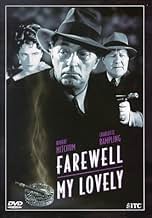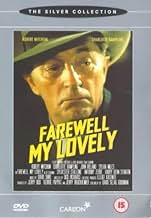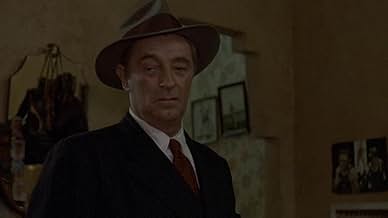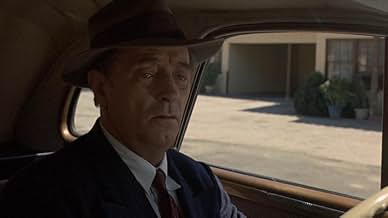VALUTAZIONE IMDb
7,0/10
10.436
LA TUA VALUTAZIONE
L'investigatore privato di Los Angeles Philip Marlowe viene assunto dal detenuto in libertà vigilata Moose Malloy per trovare la sua ragazza Velma, ex ballerina di uno squallido locale nottu... Leggi tuttoL'investigatore privato di Los Angeles Philip Marlowe viene assunto dal detenuto in libertà vigilata Moose Malloy per trovare la sua ragazza Velma, ex ballerina di uno squallido locale notturno.L'investigatore privato di Los Angeles Philip Marlowe viene assunto dal detenuto in libertà vigilata Moose Malloy per trovare la sua ragazza Velma, ex ballerina di uno squallido locale notturno.
- Regia
- Sceneggiatura
- Star
- Candidato a 1 Oscar
- 1 vittoria e 3 candidature totali
Jimmy Archer
- Georgie
- (as Jimmie Archer)
Recensioni in evidenza
This re-make of Raymond Chandler's work has the edge on the 1944 film. Robert Mitchum's face fits the film perfectly. His ageing hard boiled-looking features look like a relief map of the Rocky Mountains! In this movie Mitchum was as good he has ever been. He got better as he got older. What I also liked was the haunting but soulful musical score, at the beginning and at the end.
In the closing scene an atmosphere of rising crisis that seems to hang in the air; created by the soulful musical score. Marlow with the case all wrapped up and himself at a loose end; in the amusement centre playing the machines, picks up a discarded newspaper with "Tokyo" in bold print as the front page headline. Was this the late hours of the 6th of December in Los Angeles? A sailor and his girl, and a soldier in the background makes it seem so. Both the sailor and the soldier, and the whole of America blissfully unaware, that a Japanese armada has shaped a easterly course
across the North Pacific. That scene coupled with the soulful musical score is like a forlorn-sounding and doom-laden overture to what is about to happen with surprising and devastating suddenness on the following but quiet Sunday morning in Hawaii. It is not surprising that one of the songs is titled, "Sunday".
In the closing scene an atmosphere of rising crisis that seems to hang in the air; created by the soulful musical score. Marlow with the case all wrapped up and himself at a loose end; in the amusement centre playing the machines, picks up a discarded newspaper with "Tokyo" in bold print as the front page headline. Was this the late hours of the 6th of December in Los Angeles? A sailor and his girl, and a soldier in the background makes it seem so. Both the sailor and the soldier, and the whole of America blissfully unaware, that a Japanese armada has shaped a easterly course
across the North Pacific. That scene coupled with the soulful musical score is like a forlorn-sounding and doom-laden overture to what is about to happen with surprising and devastating suddenness on the following but quiet Sunday morning in Hawaii. It is not surprising that one of the songs is titled, "Sunday".
Farwell My Lovely is much closer to the novel than the other previous adaptation Murder My Sweet from the 40's. This film is also a better film, but it has some flaws and seems like it was just made a decade too late. For starters let's talk Phillip Marlowe, Raymond Chandler's anti-hero. I liked Bogart's Marlowe a whole lot and find his portrayal my favorite, yet Mitchum does a very credible even superior job as the private eye working within his own code of ethics. He says the narration lines wonderfully and he looks 1940's. He, if the lighting is really good which fortunately for him isn't too terribly often, looks a little worse for wear at times, but I believe he carries the role off both in spirit and physicality. The rest of the cast is equally good with some spot-on character acting from the likes of John Ireland, Anthony Zerbe, and Sylvia Miles giving a really good performance as a lush and one time lounge singer. The story, like much of Chandler's work,is surprisingly complex as Marlowe is brought into the case of a missing girlfriend of an ex-con and another case of abducted jade jewelry - both cases melding together and bringing about a rather astounding conclusion. Director Dick Richards conveys the atmosphere of the time period impeccably. Farewell My Lovely is a solid mystery with a chance to see some first-rate acting by an American screen legend Robert Mitchum.
Farewell, My Lovely (1975)
A Truly Gorgeous, Vivid, Stylish Color Noir...Don't Prejudge it on 1940s Noir Terms!
This is a gorgeous surprise, a retreat forward, a 1940s drama not done in painful nostalgic pastel hues and soft edges, but in bold bright 1975 color and pitch dark shadow. You have to say the obvious and get it over with: yes, this is a modern "film noir." But it isn't a mere homage, nor a remake, nor a cheap imitation. Director Dick Richards, who has no other well known film to his credit, pulls a gem out of nowhere on this one. Just be sure to watch it for what it is, a dramatic period crime film, not for what you think it ought to be, a slavish remake of a classic noir. And he has the help of the perfect cinematographer for the subject, John A. Alonzo, who did both Chinatown (the year before) and eight years later, Scarface, both post-noir landmark crime films.
Of course, this version of Farewell, My Lovely is, strictly speaking, a remake, which is to say, it's the third movie based on Raymond Chandler's 1940 novel of the same name. And inevitably we are going to compare to the other great version, Dmytryk's 1944 true, early film noir (called Murder, My Sweet). I say other great version, because both are really fine films, and different enough to avoid copycatting. Farewell, My Lovely is actually the more original of the two, an irony after 31 years of influences. And in some ways it's better, mainly because it has Robert Mitchum very much in top form. He makes those beautifully concise and witty one liners seem real and fitting, as if people really did once talk like that. I wish they still did.
There are countless bit parts that pump up the stylishness of the movie, most memorably Sylvia Miles playing a hard-drinking has-been. And she and Mitchum have great chemistry, not as lovers, but as people from opposite sides of life who have a similar perspective on things, and they chat and resonate like old friends. (Compare this to the rougher, less involving scene in Murder, My Sweet.) Velma herself is none other than Charlotte Rampling, probably a hair miscast because Rampling has some kind of severity that the noirish femme fatales don't, as a stereotype, share. And this movie deals with stereotypes.
Mitchum above all. It's fascinating to see a movie that is meant to be fitting into a form well known enough to be able to both refer to (in style and plot) and to deviate from (so we can feel it's original intent). And to have Mitchum, with his decades of great, strong, roles, anchor it all makes for a sweet, almost poignant experience. A similar feeling might be had in the remake of Cape Fear, but for my money, this is the more interesting movie, whatever the limitations of the plot, and the big thug. Go ahead, compare the Dmytryk version to this Richards one. If you haven't seen either one, watch the more recent one first to give it a full chance. You might go away surprised.
A Truly Gorgeous, Vivid, Stylish Color Noir...Don't Prejudge it on 1940s Noir Terms!
This is a gorgeous surprise, a retreat forward, a 1940s drama not done in painful nostalgic pastel hues and soft edges, but in bold bright 1975 color and pitch dark shadow. You have to say the obvious and get it over with: yes, this is a modern "film noir." But it isn't a mere homage, nor a remake, nor a cheap imitation. Director Dick Richards, who has no other well known film to his credit, pulls a gem out of nowhere on this one. Just be sure to watch it for what it is, a dramatic period crime film, not for what you think it ought to be, a slavish remake of a classic noir. And he has the help of the perfect cinematographer for the subject, John A. Alonzo, who did both Chinatown (the year before) and eight years later, Scarface, both post-noir landmark crime films.
Of course, this version of Farewell, My Lovely is, strictly speaking, a remake, which is to say, it's the third movie based on Raymond Chandler's 1940 novel of the same name. And inevitably we are going to compare to the other great version, Dmytryk's 1944 true, early film noir (called Murder, My Sweet). I say other great version, because both are really fine films, and different enough to avoid copycatting. Farewell, My Lovely is actually the more original of the two, an irony after 31 years of influences. And in some ways it's better, mainly because it has Robert Mitchum very much in top form. He makes those beautifully concise and witty one liners seem real and fitting, as if people really did once talk like that. I wish they still did.
There are countless bit parts that pump up the stylishness of the movie, most memorably Sylvia Miles playing a hard-drinking has-been. And she and Mitchum have great chemistry, not as lovers, but as people from opposite sides of life who have a similar perspective on things, and they chat and resonate like old friends. (Compare this to the rougher, less involving scene in Murder, My Sweet.) Velma herself is none other than Charlotte Rampling, probably a hair miscast because Rampling has some kind of severity that the noirish femme fatales don't, as a stereotype, share. And this movie deals with stereotypes.
Mitchum above all. It's fascinating to see a movie that is meant to be fitting into a form well known enough to be able to both refer to (in style and plot) and to deviate from (so we can feel it's original intent). And to have Mitchum, with his decades of great, strong, roles, anchor it all makes for a sweet, almost poignant experience. A similar feeling might be had in the remake of Cape Fear, but for my money, this is the more interesting movie, whatever the limitations of the plot, and the big thug. Go ahead, compare the Dmytryk version to this Richards one. If you haven't seen either one, watch the more recent one first to give it a full chance. You might go away surprised.
This version of Raymond Chandler's classic detective novel is more faithful to the original book than the 1940s version filmed as 'Murder, My Sweet', and includes some of the racial and sexual aspects that weren't able to be included earlier. However despite being more faithful for me it still isn't as entertaining. And Robert Mitchum in his prime could act Dick Powell off the screen, but unfortunately as good as Mitchum is in this movie it's about twenty years too late for him to play Philip Marlowe. If Mitchum had starred in 'Murder, My Sweet' it would might have been THE definitive 1940s Noir, but comparing the two versions as they stand, Powell beats Mitchum hands down. Even so, there is a lot going for 'Farewell, My Lovely' and it is quite an underrated movie. Mitchum may be too old but he is still compelling, and the supporting cast is first rate, and includes veteran character actor John Ireland, Charlotte Rampling ('Zardoz'), Harry Dean Stanton ('Repo Man'), Sylvia Miles ('Midnight Cowboy'), Anthony Zerbe ('The Omega Man'), a pre-'Rocky' Sly Stallone, Joe Spinell ('Maniac') , Rainbeaux Smith ('Caged Heat') and even pulp fiction legend Jim Thompson. If you MUST choose between the two versions I'd go for 'Murder, My Sweet', but 'Farewell, My Lovely' is still a very good movie. Watch them both, they make a hell of an interesting double bill!
L.A. of June 1941 as it was depicted in the Raymond Chandler's novel of the same title is filled with the dark secrets of the past that better stay uncovered. Philip Marlow, PE (Robert Mitcum) takes a job to find a vanished girlfriend of the felon Moose Malloy, and he has no idea what will follow. As Marlow searches for Velma Galento, he has to deal with a beautiful but cold and calculating seductress (Charlotte Rampling - young, sensual and dangerous), a jealous corrupt detective (Stanton), an old alcoholic girlfriend (Sylvia Miles in one of her two Oscar nominated performances, second - the shortest in the history of Oscars, for "Midnight Cowboy"), and a buffed thug (Sylvester Stallone -- it was fun to see him before he became a star of Rocky and Rambo).
This adaptation of Raymond Chandler novel features action, suspense, humor, mystery and Robert Mitchum in one of his best performances as a man struggling with cynicism, hatred, and betrayal.
This adaptation of Raymond Chandler novel features action, suspense, humor, mystery and Robert Mitchum in one of his best performances as a man struggling with cynicism, hatred, and betrayal.
Lo sapevi?
- QuizIn the novel, Philip Marlowe was in his 30s. Robert Mitchum, who plays him in this film, was 57.
- BlooperWhen Marlowe (Robert Mitchum) drives up to Mrs. Grayle's home (Charlotte Rampling), the front entrance is obviously double doors but when the butler is shown opening it from the inside, it is clearly a single door.
- Citazioni
Philip Marlowe: [voiceover] The house itself wasn't much. It was smaller than Buckingham Palace and probably had fewer windows than the Chrysler building.
- ConnessioniFeatured in Proini peripolos (1987)
- Colonne sonoreI've Heard That Song Before
Words and Music by Jule Styne and Sammy Cahn
Sung in the dance hall at the opening.
I più visti
Accedi per valutare e creare un elenco di titoli salvati per ottenere consigli personalizzati
- How long is Farewell, My Lovely?Powered by Alexa
Dettagli
Botteghino
- Budget
- 2.500.000 USD (previsto)
Contribuisci a questa pagina
Suggerisci una modifica o aggiungi i contenuti mancanti


































